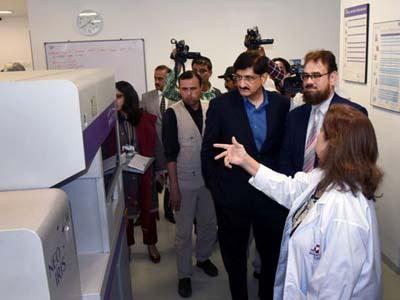
Sindh government performing amazingly in health sector: Umar Rehman Malik
Abdullah Jan
Islamabad: Pakistan People’s Party (PPP) leader Umar Rehman Malik said this week that the Sindh government led by the PPP was performing amazingly in the health sector.
“The Sindh government under the vision of Bilawal Bhutto Zardari has made significant strides in combating fatal diseases, earning commendation both nationally and internationally,” he said in a statement.

The PPP leader said these efforts include providing free, high-standard treatment to patients from across the country, ensuring that quality healthcare was easily accessible.
“The initiatives have set a new benchmark in public health services, reflecting PPP’s ‘s commitment to improving healthcare infrastructure and patient outcomes. Once again, data and facts speak for themselves,” he added.

Earlier, a one year study by PALISI Global Health revealed that “Mortality rates associated with critical illness in children at Sindh Government hospitals stands at 1.2pc, compared to the average of 6.3pc across 46 sites in 19 low-income countries.”
Mortality rates associated with critical illness in children at Sindh government hospitals stand at 1.2pc, compared to the average of 6.3pc across 46 sites in 19 low-income countries, the latest research conducted by a US-based global health network regarding quality of paediatric emergency rooms (ERs) reveals.
The one-year point prevalence study by PALISI Global Health, which was founded in 2002 with an aim to foster research to optimise the care of critically ill infants and children, measured the burden of paediatric acute critical illness in resource constrained settings.
Conducted from 2021 to 2022, the researchers specifically evaluated paediatric emergency rooms at Sindh government’s Civil Hospital Karachi and Sheikh Zayed Children Hospital, Larkana.
The study revealed the importance of increasing access to high quality, basic critical care services to improve outcomes for children worldwide. It emphasised the importance of a comprehensive, multi-sectoral approach to tackle acute critical illness in children within resource-constrained settings.
Key components identified for success include well-trained and dedicated healthcare professionals, adequate medical supplies and equipment, properly designed and equipped medical facilities, efficient healthcare systems and protocols, continuous support and collaboration from various sectors.
The report showed that by strengthening healthcare infrastructure, providing extensive staff training, and optimising resource allocation, the Sindh government in collaboration with ChildLife Foundation, significantly improved child health outcomes and reduced the burden of critical illness and related mortality.
In 13 years, the Sindh government under the public-private partnership model successfully treated six million children in ERs of public hospitals across the province. The government modernised nine children ERs of public tertiary care hospitals in the province, resulting in a significant increase in the survival rate of critically ill children.
